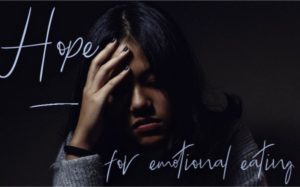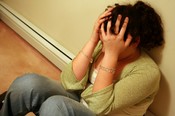 By Darcy Tucker, MA, LAMFT
By Darcy Tucker, MA, LAMFT
 Susan was a patient in Remuda’s Emotional Eating Program. Susan experienced body dissatisfaction from a young age. She knew that she had an honest mix of her mother’s larger bone structure and her father’s tendency to hold weight around the middle. Struggling with her weight most of her life, she realized in her late 30s that she had tried practically every weight-loss method and yet ended up gaining more weight after each dieting attempt. She was angry with herself for being unable to control what she ate and her ongoing weight gain.
Susan was a patient in Remuda’s Emotional Eating Program. Susan experienced body dissatisfaction from a young age. She knew that she had an honest mix of her mother’s larger bone structure and her father’s tendency to hold weight around the middle. Struggling with her weight most of her life, she realized in her late 30s that she had tried practically every weight-loss method and yet ended up gaining more weight after each dieting attempt. She was angry with herself for being unable to control what she ate and her ongoing weight gain.
Susan was experiencing acid reflux, difficulty sleeping, constipation, and arthritis in her knees. Her physician diagnosed her with hypertension and elevated cholesterol, putting her at increased risk for stroke. She was also at high risk for developing Type II diabetes. She entered the Emotional Eating Program because everything else she had tried had failed. Susan was anxious because she was used to weight loss programs, but the program was focused less on weight loss and more on the underlying issues that lead to a patient’s current condition. Susan knew that she needed something that could reach her spiritually. But emotionally, she was still quite focused on weight loss as her ultimate goal and the one thing that could bring her happiness.
GETTING HELP
At admission, Susan was sad and somewhat anxious. She was diagnosed with moderate depression and mild anxiety. Her psychosocial assessment revealed an extensive history of increasing guilt and shame, evidenced by growing disgust for her body. With this, Susan’s psychiatric provider recommended that Susan begin taking Fluoxetine for depression.
Emotional Eating patients have been anywhere from 10 to 185 pounds overweight. Susan was in the higher range. She weighed 237 lbs., 159% of her ideal body weight. Her Body Mass Index (BMI) was 39.4, at the top end of the obesity range. Susan often ate alone and in secret, feeling ashamed because she could not control her eating behaviors and because of the stigma that her family and society place on obesity. She used moderate amounts of caffeine, diet and reduced calorie products, and had attempted smoking cigarettes to control her weight. She occasionally used drastic weight control measures, but was unable to maintain the weight loss or the behaviors; she would soon lose control and binge eat once again.
Prior to coming to the center, she had not recognized the multitude of times each day and night that she ate without regard to sensations of hunger or fullness. Susan ate between meals, mostly sweet, salty, and high-carbohydrate foods. During group meals she often denied her feelings of hunger, but would hide food for later when she was alone. During a binge, or “uncontrollable eating” as she called it, she reported feeling “detached, zoned out, and out of control”.
DISCOVERY, SKILLS AND A PLAN
With the help of her dietician and therapist, Susan began to recognize her pattern of regulating emotions by zoning out through uncontrollable eating. Her therapist began by teaching Susan distress tolerance skills on which to rely instead of her binge eating behaviors. She was delighted at the emotional depth this allowed her to feel, and the relief of having tools to lean on during emotionally difficult moments rather than food.
Susan and her therapist identified issues that made it hard for her to deal openly and directly with her difficulties. These issues included a history of superficial relationships, people-pleasing, feeling empty inside, and care-taking her family. Her actual eating disorder began when she was a teenager, with the social and academic pressures of high school, increasing body image awareness, and an instance of sexual abuse. She had no one to talk to about these concerns, and turned to food to numb her feelings and dissociate.
Susan then identified the typical, immediate triggers to her emotional eating behavior. She identified stress, aloneness, tiredness, and feeling overwhelmed, sad, or angry. In years past, she used alcohol to soothe these feelings, but now—not wishing to become an alcoholic—she used only food.
Susan’s dietician instructed her to learn to select foods based on her enjoyment of them rather than by their caloric content. The very notion frightened her. To assist, Susan kept food logs, chronicling the food groups she had eaten across three meals and three snacks each day, noting periods of exercise and movement, including her thoughts, feelings, and emotions. Her initial nutrition plan was aimed at normalizing and regulating her eating patterns throughout the day and utilizing appropriate serving sizes. Susan learned how to leave bites behind when full, to wait 20 minutes to register fullness, and to use intuitive eating principles. She learned to rely here on her faith, forgiving herself because God forgives her, recognizing that God has given her a lifetime to grow in a spiritual process, that God does not expect perfection of her today, and that God loves her very much as she is today.
Susan also met with her dietician to assess her level of physical fitness and activity. Together, they explored the physical activities she enjoyed in the past or might enjoy if she gave herself permission to try. Susan began to exercise three times per week with staff, learning about proper techniques, cardiovascular training, strength building, and most significantly for her, stretching exercises to develop greater flexibility. She gained enough flexibility to put her shoes on comfortably—something she had been unable to do for several years. Once a week she also exercised with a group for to learn how to exercise with other people and to give herself permission to try new activities.
LESS STRESS, MORE FUN AND CONNECTING WITH GOD
Susan learned to “talk things out,” rather than suppress her feelings. She took opportunities to participate more in fun activities to decrease stress and shame about her appearance. She was taught how to recognize small accomplishments, rather than just big ones. She learned to reframe her thoughts more positively. She deepened her connection with God, learning to practice spiritual disciplines like meditation on God’s word and time alone in prayer. She recognized how her negative emotions had been controlling her choices and relationships. Over the weeks, Susan realized that consistent eating, exercising, sleeping, and connection with others and God were critical for her continued recovery and daily happiness.
Susan admitted at 237 lbs. and discharged 42 days later at 230 lbs. She was discharged with a flexible 1800 calorie per day meal plan designed for very gradual weight loss, but with the understanding that weight loss was not the measure of success. She was no longer measuring the rate or amount of weight loss, but drawing empowerment from understanding the dynamics that had kept her bound in a cycle of emotional eating most of her life.
 Susan thus left with a new sense of self, improved self-esteem, skills to manage relationships, improved emotional awareness, and hope for the future. She called these changes in knowledge and perception “a spiritual renewal and revelation of truth”. She knew that God’s grace was not something that would come one day when she achieved a specific weight, but that she was living in his grace today.
Susan thus left with a new sense of self, improved self-esteem, skills to manage relationships, improved emotional awareness, and hope for the future. She called these changes in knowledge and perception “a spiritual renewal and revelation of truth”. She knew that God’s grace was not something that would come one day when she achieved a specific weight, but that she was living in his grace today.
Download a printable version of the entire original article.

Additional related content in Faith & Fitness Magazine
Spa & Fitness Retreat department
CONTACT US – We can help your church, gym, business, or group organize a faith-centered fitness retreat with a special focus on nutrition or emotional eating.









